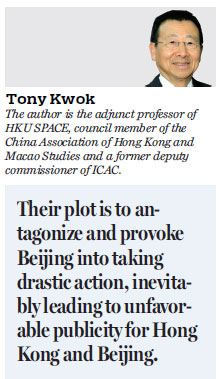Disqualification of Agnes Chow the right decision
Updated: 2018-01-31 06:39
By Tony Kwok(HK Edition)
|
|||||||
Returning officer arrived logically and legally at the conclusion that the young activist cannot be trusted to support the city's Basic Law, Tony Kwok writes
A returning officer ruled Agnes Chow Ting's nomination as a candidate for the March Legislative Council by-election invalid; as expected, anti-Beijing groups immediately came out in full force to criticize the decision as "political screening" and against their right to take part in elections.
Chow accused the government: "We can see that Hong Kong is not ruled by law or the rule of law, but only ruled by the Beijing government." But is condemning of status of rule of law justified? Let's examine the facts.
It is clearly laid down in the election law that any candidate wishing to stand for election must make an unequivocal declaration of allegiance to the Basic Law, which prohibits any independence advocacy.

Critics said Chow had already signed the declaration form but it remains the legal responsibility of the returning officer to determine the authenticity of such a declaration. As Senior Counsel and Executive Council Member Ronny Tong Ka-wah commented jokingly, if Chow ticked "man" under the slot for gender in the form, surely the returning officer has every right to verify her gender!
Chow said she is representing and supported by her political party Demosisto of which she is co-founder and current standing committee member. Hence it is only right for the returning officer to take into consideration the nature, background and political platform of Chow's political party in arriving at her decision.
Demosisto was co-founded by student activist Joshua Wong Chi-fung, notorious for his association with foreign powers in badmouthing Hong Kong and Beijing. Its party platform vows: "To counter attack the imperial Communist China government" and says the city's future lies in self-determination. It also advocates a citywide referendum on its political future, including the option of independence from China.
Any referendum on independence for a territory carries with it extremely serious consequences and should not be launched lightly. The central government of Spain had no hesitation in prosecuting key organizers of an unauthorized referendum on independence in Catalonia - or in sacking the region's parliament. Beijing has unequivocally and repeatedly warned Taiwan of dire consequences should the island province conduct a referendum on independence. Needless to say, such warnings apply to Hong Kong.
A photo widely circulated on social media showed Chow together with Wong at a July 1 reunification celebration, arms raised to form a cross and backs turned to the rising national flag. Chow was once quoted as saying in Japan that she did not want to be a Chinese citizen.
Judging these facts, can any returning officer believe Chow would sincerely swear allegiance to the Basic Law? Hence the returning officer arrived logically and legally at the conclusion that Chow cannot be trusted to support the Basic Law, which states Hong Kong is an inalienable part of China. That is why Chief Executive Carrie Lam Cheng Yuet-ngor reiterates that the decision was undertaken in accordance with the law.
What if Chow openly advocated independence - there would be no disputing immediate disqualification. The difference is that she is a senior member of a party which supports just such an illegal move. Indeed, there is already a precedent in the 2016 LegCo election; when the returning officer disqualified candidate Chan Ho-tin, from a political party advocating "Hong Kong independence", and no strong objections were raised from any quarter.
It is interesting to note that following the returning officer's decision, Demosisto quietly deleted from its homepage and political platform any reference to self-determination and referendum, as well as the derogatory phrase "To counter attack the imperial Communist China government". It's an obvious admission of guilt!
Just consider the serious consequence of Chow being allowed to stand. Opposition legislator Eddie Chu Hoi-dick has already tried to promote the March by-election as a showdown between the people of Hong Kong and Beijing. If Chow happened to win the election as a pro-independence candidate, supporters would claim this is a referendum on independence and the people of Hong Kong had voted for independence. They would then conspire with foreign powers to put "Hong Kong independence" on the international agenda, possibly before the United Nations. Their plot is to antagonize and provoke Beijing into taking drastic action, inevitably leading to unfavorable publicity for Hong Kong and Beijing. Is this what Hong Kong people want to see?
Hence the disqualification of Chow is the right decision and very much in Hong Kong's interests. But even if Chow were allowed to stand, her election would surely be challenged by judicial review which would no doubt rule against her - another massive waste of taxpayers' money which would let opposition politicians put Hong Kong through more needless turmoil.
The administration should remain steadfast over three related misguided developments. Two prominent supporters of Demosisto - former governor Chris Patten and his fellow British peer Paddy Ashdown - have just written to United Kingdom Prime Minister Theresa May, seeking that she raise the issue of alleged threats to Hong Kong's human rights and autonomy with President Xi Jinping in their upcoming meeting. We can only take offense at such unfounded allegations as we scored higher than the UK in the sphere of rule of law. We should remain equally steadfast over a joint statement by some legal practitioners, who took issue with the disqualification. Lam has rightly dismissed the European Union's accusation that it "risks diminishing Hong Kong's international reputation as a free and open society". She also rightly rejected suggestions that the decision was influenced by Beijing.
(HK Edition 01/31/2018 page7)